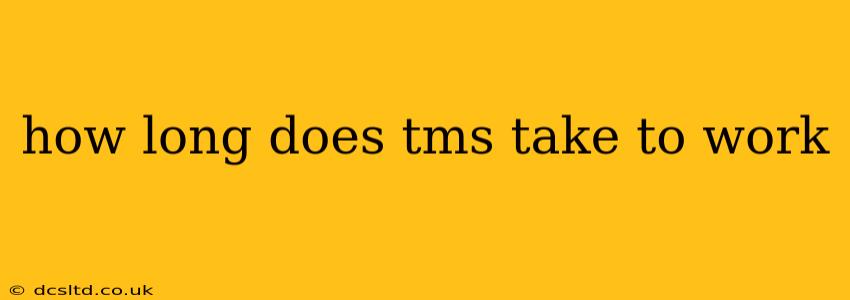Transcranial magnetic stimulation (TMS) is a non-invasive brain stimulation therapy used to treat various mental health conditions, most notably depression. Many people wonder, "How long does TMS take to work?" The answer isn't straightforward, as the timeline varies significantly depending on several factors. This comprehensive guide explores the process, effectiveness, and timeframe associated with TMS treatment.
What is TMS Therapy?
TMS uses magnetic pulses to stimulate specific areas of the brain. These pulses are delivered via a coil placed against the scalp, inducing electrical currents that alter brain activity. For depression, the targeted area is usually the dorsolateral prefrontal cortex (DLPFC), a region involved in mood regulation. The procedure is typically painless, although some patients report mild discomfort or a tapping sensation on their scalp.
How Long Does it Take to See Results from TMS?
The time it takes to experience the benefits of TMS varies greatly among individuals. Some people start noticing improvements within a few weeks, while others may take longer. It's crucial to understand that TMS is not a quick fix. It's a course of treatment, and consistent sessions are vital for achieving optimal results.
Generally, the following timeline can be observed:
- Initial Weeks (1-4): Many patients report feeling no significant changes during the first few weeks of treatment. This is normal.
- Weeks 4-6: Some patients may begin to notice subtle improvements in mood, energy levels, or sleep patterns during this period.
- Weeks 6-8 and beyond: More significant improvements are often observed after the first month or two of consistent treatment. The full therapeutic effect may not be apparent until the entire course of treatment is completed.
The total number of sessions usually ranges from 4 to 6 weeks, with daily treatments. However, the optimal duration and frequency of treatment are determined by a healthcare professional based on individual needs and response.
Factors Influencing the Time TMS Takes to Work
Several factors influence how quickly a patient responds to TMS therapy:
- Severity of the condition: Individuals with mild depression may see results faster than those with severe or treatment-resistant depression.
- Individual response to treatment: Each person's brain responds differently to TMS. Some individuals are more responsive than others.
- Adherence to the treatment plan: Regular attendance at TMS sessions is crucial for optimal results. Missing sessions can significantly impact the effectiveness of the therapy.
- Co-occurring conditions: The presence of other mental health or medical conditions can influence the treatment's efficacy and timeline.
- Type of TMS device used: Different types of TMS devices may have varying treatment times and effectiveness.
What if TMS Doesn't Work Right Away?
If you don't notice any improvements after several weeks of TMS treatment, don't despair. It's important to communicate with your healthcare provider. They may adjust the treatment parameters, such as the intensity of the magnetic pulses or the targeted brain area, or consider alternative treatment strategies.
How Long Do TMS Benefits Last?
The duration of TMS benefits can also vary considerably. Some individuals maintain improvement for many months or even years after completing their course of treatment. Others may require maintenance sessions or additional treatments to sustain their progress. This is often discussed with the patient and their doctor to plan appropriately.
Are There Any Side Effects?
While generally considered safe, TMS can have potential side effects, which are usually mild and temporary. Common side effects include headache, scalp discomfort at the stimulation site, and lightheadedness. These side effects typically resolve quickly.
What to Expect During a TMS Session?
A typical TMS session lasts around 20-40 minutes. During the session, you will comfortably sit or lie down while the TMS coil is placed against your scalp. The treatment itself is generally painless, although you may feel a tapping or clicking sensation.
Conclusion
The question, "How long does TMS take to work?" doesn't have a single answer. The timeline varies depending on several factors, including the severity of the condition, individual response, and adherence to treatment. While some individuals may see results within weeks, others may require more time. Open communication with your healthcare provider is crucial throughout the treatment process to ensure you receive the best possible care. Remember, TMS is a course of treatment, and consistency is key to achieving optimal outcomes.
